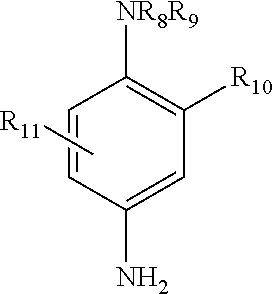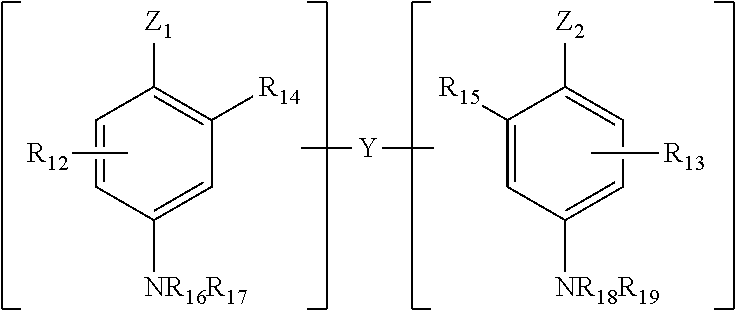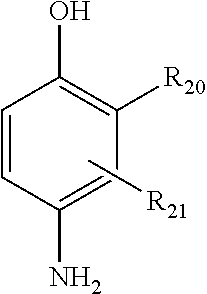Methods for altering the color and appearance of hair
a technology for hair and cuticles, applied in the field of methods for altering the color and appearance of hair, can solve the problems of hair breakage and loss, skin and/or scalp irritation, adversely affecting the condition of hair and hair cuticles, and preventing consumers from achieving the desired lightening or shade/color effect, etc., to minimize damage to hair and/or skin.
- Summary
- Abstract
- Description
- Claims
- Application Information
AI Technical Summary
Benefits of technology
Problems solved by technology
Method used
Image
Examples
example 1
[0436]The hair can be pre-alkalized, and then the following cream color can be applied to the hair:
[0437]
INCI USconcentrationERYTHORBIC ACID0.4ETHANOLAMINEEDTA0.2SODIUM SULFITE0.1OXIDATIVE DYE PRECURSORS2.78FRAGRANCE0.3MICA (and) TITANIUM DIOXIDE0.3POLYQUATERNIUM-6 AND CETYL2.4HYDROXYETHYLCELLULOSEGLYCERIN3SURFACTANTS22.5WATERQS
[0438]After the hair color is processed for about 10 minutes, the hair is optionally rinsed. Next, a 92:8 shampoo:activator developer composition can be applied to the hair:
[0439]Shampoo
[0440]
INCI US NameConcentrationWATER66.25POLYQUATERNIUM-100.8AMMONIUM HYDROXIDE0DISODIUM COCOAMPHODIACETATE10SALICYLIC ACID0.45BENZOIC ACID0.45TARTARIC ACID0.1SODIUM LAURETH SULFATE13.85FRAGRANCE0.3PEG-60 HYDROGENATED CASTOR OIL0.5CITRIC ACID4ETHYLHEXYL METHOXYCINNAMATE0.05TOCOPHERYL ACETATE0.05HEXYLENE GLYCOL1AMMONIUM HYDROXIDE3.2Total100
[0441]Activator
[0442]
INCI US NameConcentrationSODIUM PERSULFATE75SILICA2.3ZEA MAYS (CORN) STARCH20EDTA1HYDROGENATED POLYDECENE1.7Total100
[04...
example 2
Compositions
[0444]Color-Altering Composition
[0445]
%ConcentrationINCI NameCommercial Nameactivity(wt %)Laureth-12Alkonat L 1201003(Oxiteno)Oleth-30Genapul U 300 F1002(Clariant)Sodium Cetearyl SulfateLanette e Granules961.5(Cognis)Cetearyl AlcoholN / A1002Sodium SulfateN / A1002Laureth-2Arylpon F1008(Cognis)PEG-4 RapeseedamideAmidet N92.3054(Kao)Trideceth-2Amidet A15 / Lao 151004(Kao)GlycerinGlycerine 48331003(Oleon)Polyquaternium-6Merquat 100 polymer402(Nalco)Sodium SulfiteSodium Sulfite Anhydrous1000.1(BASF)EDTAEDTA1000.2(Chemofine Industries)Erythorbic AcidErythorbic Acid1000.4(Zhengzou Tuoyang)2-Methylresorcinol2-Methylresorcinol1000.6(DSM)4-Amino-2-Hydroxytoluene5-Amino-o-cresol1000.15(GL Synthesis)2-Amino-3-Hydroxypyridine2-amino-3-hydroxypyridine LOR1000.2(Changshu League Chemical)Hydroxyethyl 4,5-DiaminoJarocol AHP1001.4Pyrazole Sulfate(Vivimed)2,3-DiaminohydropyrazoloImexine OBH1000.3Pyrazolone Dimethosulfonate(Chimex)Toluene-2,5-DiamineImexine OD990.13(Chimex)Cetyl Hydroxyethylcel...
PUM
 Login to View More
Login to View More Abstract
Description
Claims
Application Information
 Login to View More
Login to View More - R&D
- Intellectual Property
- Life Sciences
- Materials
- Tech Scout
- Unparalleled Data Quality
- Higher Quality Content
- 60% Fewer Hallucinations
Browse by: Latest US Patents, China's latest patents, Technical Efficacy Thesaurus, Application Domain, Technology Topic, Popular Technical Reports.
© 2025 PatSnap. All rights reserved.Legal|Privacy policy|Modern Slavery Act Transparency Statement|Sitemap|About US| Contact US: help@patsnap.com



